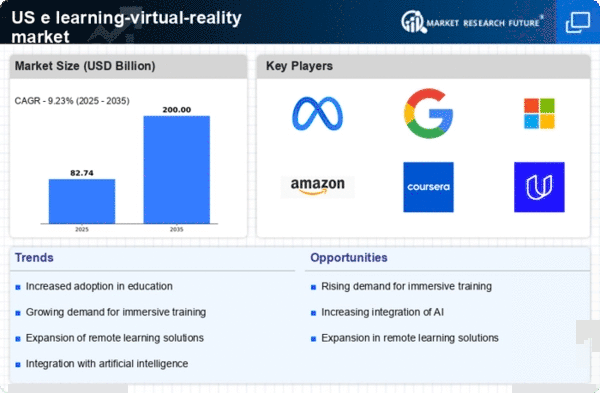Increased Investment in EdTech
The e learning-virtual-reality market is benefiting from increased investment in educational technology (EdTech). Venture capital funding for EdTech startups has surged, with investments reaching approximately $10 billion in 2025. This influx of capital is enabling the development of innovative VR solutions tailored for educational purposes. Investors are particularly interested in platforms that offer scalable and effective learning experiences, which are essential for meeting the diverse needs of learners. As more educational institutions adopt VR technologies, the competition among EdTech companies is likely to intensify, leading to further advancements in the e learning-virtual-reality market. This trend suggests a promising future for VR applications in education, as funding continues to support research and development.
Technological Advancements in VR
The e learning-virtual-reality market is experiencing a surge in technological advancements that enhance the learning experience. Innovations in hardware and software, such as improved graphics and user interfaces, are making virtual reality more accessible and engaging for learners. For instance, the introduction of lightweight VR headsets and more intuitive software platforms is likely to increase user adoption rates. According to recent data, the market for VR hardware is projected to reach $12 billion by 2026, indicating a robust growth trajectory. These advancements not only improve the quality of educational content but also facilitate immersive learning environments, which are essential for effective skill acquisition in various fields. As educational institutions increasingly integrate these technologies, the e learning-virtual-reality market is poised for significant expansion.
Shift Towards Personalized Learning
The e learning-virtual-reality market is experiencing a shift towards personalized learning approaches. Educators are increasingly recognizing that one-size-fits-all solutions are inadequate for addressing the diverse needs of students. Virtual reality allows for tailored educational experiences that adapt to individual learning styles and paces. This customization is supported by research indicating that personalized learning can improve student outcomes by up to 30%. As educational institutions strive to enhance student performance, the demand for VR solutions that facilitate personalized learning is likely to grow. This trend not only enhances the effectiveness of educational programs but also positions the e learning-virtual-reality market as a critical component in the future of education.
Growing Demand for Interactive Learning
The e learning-virtual-reality market is witnessing a growing demand for interactive learning experiences. As traditional educational methods become less effective in engaging students, educators are seeking innovative solutions that foster active participation. Virtual reality offers immersive environments where learners can interact with content in ways that traditional methods cannot replicate. This shift is supported by data indicating that students retain information better when they are actively involved in the learning process. Furthermore, a survey revealed that 70% of educators believe that VR can enhance student engagement. This increasing recognition of the benefits of interactive learning is likely to drive investment in VR technologies, thereby propelling the growth of the e learning-virtual-reality market.
Expansion of Corporate Training Programs
The e learning-virtual-reality market is witnessing an expansion in corporate training programs that leverage VR technologies. Companies are increasingly adopting virtual reality for employee training, recognizing its potential to provide immersive and realistic simulations. This approach is particularly effective in industries such as healthcare, manufacturing, and aviation, where hands-on experience is crucial. Data suggests that organizations using VR for training can reduce training time by up to 40% while improving retention rates. As businesses seek to enhance workforce skills and reduce training costs, the demand for VR-based training solutions is likely to rise. This trend indicates a growing recognition of the value of immersive learning experiences in the corporate sector, further driving the e learning-virtual-reality market.

















